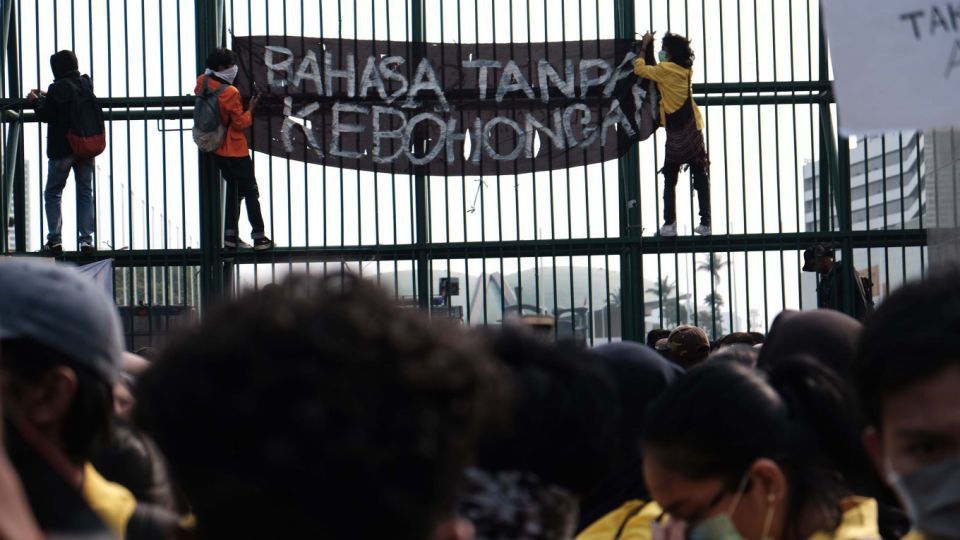December 6, 2022
JAKARTA – Lawmakers are pressing ahead with plans to pass a revised Criminal Code on Tuesday that would dilute antigraft rules and civil liberties, insisting that they have taken public opinion into account despite civil society protests to the contrary.
House of Representatives Deputy Speaker Sufmi Dasco Ahmad announced on Monday that the passage of the Criminal Code bill was scheduled for the following day.
“We have discussed this with House leaders and the House’s Steering Committee [Bamus] – to pass the bill into law in the coming plenary session,” Dasco said.
Some lawmakers insisted that they had accommodated public opinion, claiming provisions widely deemed draconian had been watered down, such as ones criminalizing insulting a sitting president and outlawing cohabitation before marriage, as well articles governing the death penalty.
Nonetheless, the bill retains a number of contentious articles.
Muhammad Nurdin, member of House Commission III overseeing legal affairs, which late last month endorsed the bill to be brought to a House plenary session, said the deliberation of the bill had finished and would not be reopened.
“If there are provisions deemed not in accordance with the Constitution, please bring them to the Constitutional Court for a review,” he added.
Another Commission III member, Supriansa of the Golkar Party, said members of the public had had the chance to voice their opinions during the bill’s deliberation in Commission III, which had finished about two weeks prior.
Protests
The sudden revelation of plans to pass the bill on Tuesday had activists worried.
Lawmakers and the executive had been trying to fast-track the deliberation of the bill this year and had never clearly defined when they would pass the bill, but said that it would be done sometime before the House went into recess this month.
Activists belonging to a coalition of some 40 civil society groups that have been keeping tabs on the bill, as well as students, staged a rally in front of the House complex in Jakarta on Monday. They demanded that lawmakers postpone the passage of the bill until the contentious provisions could be properly and publicly addressed, arguing that the bill as it stood would curb civil liberties even further amid a current of democratic backsliding in the country.
“If lawmakers keep pressing ahead with the passage of the bill […], this will be a betrayal of the people who chose them as our representatives,” Citra Referandum of the Jakarta Legal Aid Institute (LBH Jakarta) said at the rally.
The protesters are also planning a last-ditch demonstration on Tuesday to pressure lawmakers into delaying the bill’s passage.
The latest version of the bill, released by the government on Saturday, reduces the punishment for corruption from a minimum of four years in prison to two years. The maximum penalty remains 20 years in prison.
The bill also maintains that insulting a sitting president is a crime, although it has reduced the maximum penalty from 3.5 years in prison to three. The provisions are not applicable to criticism voiced during a demonstration, but critics say the provisions could still significantly stifle free speech.
Meanwhile, the latest changes to a ban on non-Pancasila ideologies that the government introduced late last month have created even vaguer provisions. The government expanded the longstanding ban on promoting communism or Marxism-Leninism to all “other ideologies that contradict Pancasila” without a clear definition of what constituted anti-Pancasila ideology or which institution had the authority to decide.
‘Bring it to court’
The government has touted a series of consultations involving certain members of the public, such as students and legal experts, held between August and October at the instruction of President Joko “Jokowi” Widodo in response to public opposition to a number of the planned Criminal Code revisions.
The government said once again on Monday that it had given members of the public the chance to voice their opinions.
“To make all people agree with all the provisions in the bill is impossible,” Law and Human Rights Minister Yasonna Laoly said. “When the bill is passed into law, [if you object,] just bring it to the Constitutional Court.”
Citra said civil groups hoped instead that lawmakers would repeal problematic articles from the bill before it was passed into law. She said policymakers were obligated to allow the public to participate in the lawmaking process, rather than passing the buck to the Constitutional Court.


